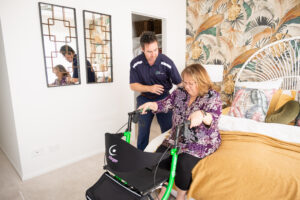The Role of Mobile Allied Health Assistants in Modern Medicine

Did you know that the global market for mobile health solutions is expected to reach over $300 billion by 2025? This rapid growth reflects a significant shift in how healthcare is delivered, particularly through the efforts of allied health professionals who are expanding access to care using innovative mobile technologies.
Mobile Allied Health Assistants are at the forefront of this transformation, bridging the gap between patients and providers by delivering personalised, high-quality care outside traditional healthcare settings. As the demand for accessible and efficient healthcare continues to rise, these professionals play a crucial role in shaping the future of modern medicine through mobile health solutions and advanced digital health applications.
Understanding Mobile Allied Health Assistants
Allied health professionals have always been integral to the healthcare system, delivering specialised services that address diverse patient needs. Traditionally, these roles were limited to clinical settings such as hospitals, outpatient clinics, and rehabilitation centres. However, the landscape began to shift with advancements in mobile technology.
The emergence of telehealth, digital health tools, and mobile applications has expanded the scope of allied health services, allowing professionals to reach patients wherever they are. This shift has not only increased accessibility and convenience but also empowered patients to take a more active role in their healthcare journey, marking a significant evolution in the allied health profession. Mobile Allied Health Assistants now stand at the forefront of this transformation, leveraging technology to deliver flexible, patient-centred care that meets the growing demand for healthcare innovation.
Benefits of Mobile Allied Health Assistants
Improved Patient Care
Mobile Allied Health Assistants significantly enhance patient care by providing services directly in the patient’s environment, whether at home, in the community, or even remotely through telehealth. This approach breaks down barriers to access, particularly for those in rural or underserved areas, and allows for more personalised care. By meeting patients where they are, these assistants can tailor interventions to the individual’s specific needs, monitor progress in real-time, and make adjustments on the fly. This level of customisation not only improves the effectiveness of care but also increases patient satisfaction and engagement, leading to better overall health outcomes.
Efficiency and Convenience
Mobile solutions streamline the delivery of allied health services, making them more efficient and convenient for both healthcare providers and patients. For providers, mobile technology reduces the time spent on administrative tasks and travel, allowing them to see more patients in a day. For patients, it eliminates the need to travel to appointments, wait in clinics, or adjust their schedules significantly, making it easier to fit healthcare into their daily lives. This increased efficiency translates to faster service delivery, shorter wait times, and more immediate access to care, all of which contribute to a more responsive healthcare system.
Cost-Effectiveness
The cost benefits of Mobile Allied Health Assistants are substantial for both healthcare systems and patients. By delivering care outside of traditional clinical settings, these services reduce overhead costs associated with maintaining facilities and equipment. For patients, at-home or remote care can mean fewer out-of-pocket expenses related to travel, childcare, or time off work. Moreover, early and consistent intervention by Mobile Allied Health Assistants can prevent more serious health complications that would require costly medical treatments or hospitalisations. This proactive approach not only improves health outcomes but also reduces the overall financial burden on the healthcare system, making it a sustainable model for the future.
The Future of Healthcare with Mobile Allied Health Assistants

Innovations on the Horizon
The future of healthcare is increasingly digital, with emerging innovations poised to further elevate the role of Mobile Allied Health Assistants. One promising development is the integration of artificial intelligence (AI) and machine learning into mobile health platforms. AI-powered tools can analyse patient data to provide predictive insights, allowing assistants to anticipate issues and personalise care even more precisely. For example, predictive analytics can identify patients at risk of complications, enabling early interventions that can prevent hospitalisations.
Another exciting innovation is the advancement of wearable technology and remote monitoring devices, which are becoming more sophisticated and accessible. Future wearables could monitor a broader range of health metrics, such as blood oxygen levels or real-time gait analysis, giving Mobile Allied Health Assistants deeper insights into patients’ health status. Additionally, the expansion of augmented reality (AR) and virtual reality (VR) could transform how therapy is delivered, with immersive, interactive experiences that engage patients in new ways, particularly in rehabilitation and mental health care.
Challenges and Opportunities
While the potential for Mobile Allied Health Assistants is vast, there are challenges that must be addressed to fully realise their impact. One major challenge is ensuring equitable access to technology. Not all patients have the same level of access to digital devices or high-speed internet, which can create disparities in care. Addressing this will require investment in digital infrastructure and efforts to make technology more affordable and accessible, especially in rural and underserved areas.
Data privacy and security are also significant concerns, as mobile health solutions rely on the collection and storage of sensitive patient information. Developing robust cybersecurity measures and clear data governance frameworks will be crucial in maintaining patient trust and complying with regulatory standards.
Despite these challenges, the opportunities for growth and improvement are substantial. As healthcare systems continue to prioritise value-based care, Mobile Allied Health Assistants can play a key role in reducing costs and improving patient outcomes through preventive care and early intervention. Additionally, the ongoing expansion of telehealth reimbursement policies presents a significant opportunity for broader adoption of mobile health solutions. By leveraging technology to enhance accessibility, efficiency, and personalisation of care, Mobile Allied Health Assistants are well-positioned to drive the future of healthcare, making high-quality, patient-centered care the standard for all.
Embracing mobile allied health solutions can revolutionise patient care by making it more accessible, efficient, and personalised. Healthcare communities that adopt these innovative services can significantly enhance their care delivery, meeting the needs of patients wherever they are.
Team Rehab Solutions is here to help you explore the full potential of mobile allied health services. We invite you to learn more about how these solutions can be customised to fit your practice. For more information or to schedule a consultation, call us at 1300 685 046 or fill out our contact form. Let’s partner together to drive the future of healthcare through advanced, compassionate care.
